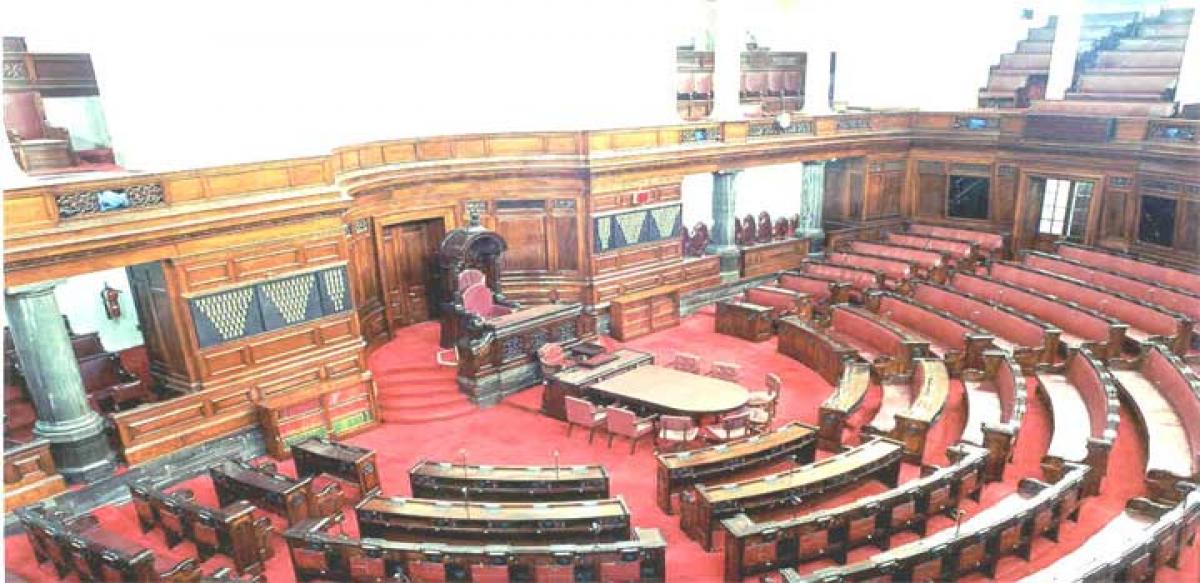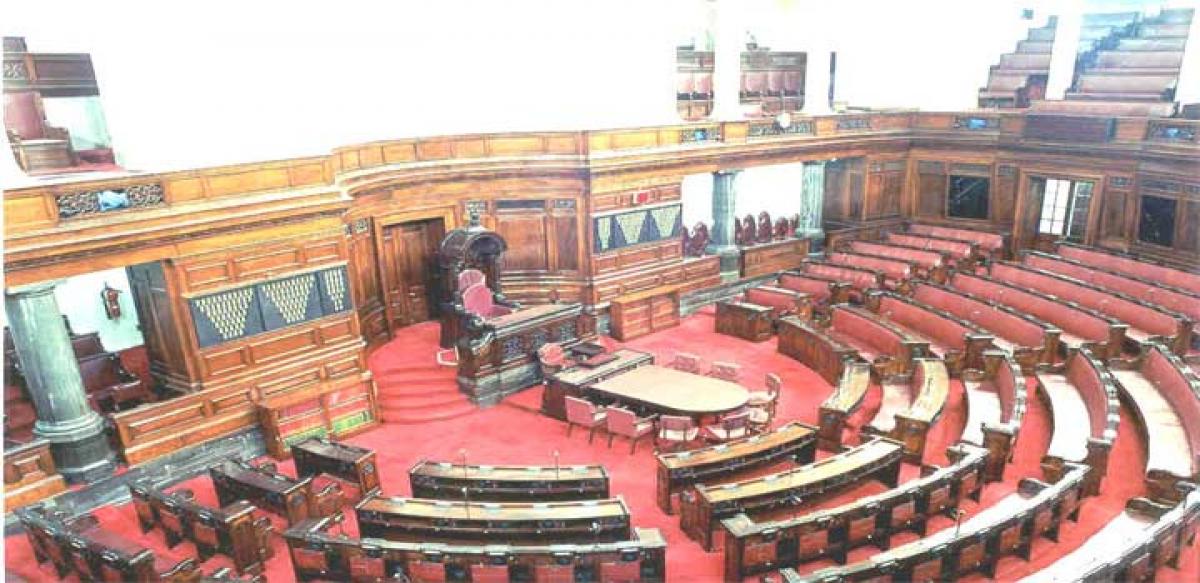Live
- Gadwal District Gears Up for NEET UG - 2025: Collector Ensures Top-Quality Exam Arrangements
- Naxalism has now given way to urban Naxalism in India: PM
- BJP ranks erupt in celebrations over MLC victory
- Massive fire breaks out at scrap godown in Bahadurpura
- Homestay facilities in tribal areas to boost tourism
- Cabinet green signals SC sub-categorisation
- 'Chintan Shivir' in Hyd to draft roadmap for 2028 Olympics
- Dy CM Bhatti lays foundation stone for road expansion
- HYDRA boss inspects lakes at Khajaguda, Ibrahimbagh
- Know about Acharya Indravarman and Most trusted astrologers on the List of Top 10 Best Astrologers in India
Just In

Quo Vadis Rajya Sabha. The current impasse in the Rajya Sabha calls into question the very raison d’etre of its existence.
That the Congress, supported by CPM, is playing a cynical and shortsighted game to undermine the credibility of BJP is all too evident. There are reliable reports to indicate that Chief Ministers belonging to the party, who are in favour of GST Act and changes in Land Acquisition Act, are being forced to recant. An introspection is imperative. In this regard, patriotic foresight and political statesmanship should prevail over myopic one-upmanship and political brownie points. That such tactics could only work to the advantage of the adversary needs to be digested. National interest is paramount. A truce is overdue. It is time for a fresh start to harness the unusually favourable global situation for taking India to new heights of prosperity and prestige
The current impasse in the Rajya Sabha calls into question the very raison d’etre of its existence. This has come at a time when older and more mature democracies like UK and France have whittled down the role of the upper chambers of Parliament.

The founding fathers of the Indian Constitution opted for a bicameral Parliament on the classical arguments which were: a. States needed a forum to voice and articulate their concerns in a federal polity weighted in favour of the Centre; b. A second chamber is needed to facilitate persons of experience, maturity and wisdom who may not like the rough and tumble of electoral politics to enter Parliament.
Such a chamber can exercise a sobering and moderating influence on the other chamber which consists largely of members whose ideological fervour, emotional exuberance and inexperience could often get the better of their judgement. A further small quota is also set aside for nomination by the President to create space and opportunity for eminent persons in the fields of art, literature and science etc; c. Old and mature democracies like UK, France and USA have all bicameral legislatures. lndia Act 1935 also provided for a second chamber.
Till the end of 80‘s, Rajya Sabha fulfilled its objectives, though veteran and experienced leaders of all political parties still preferred Lok Sabha. The Rajya Sabha route enabled Pandit Nehru to bring into his cabinet experts in various fields, many of whom did not even belong to his party. However, the virtual dominance of a single party, led by leaders who were pre-eminent in the party constrained the voice of Opposition both in legislation and policy. Even so, Nehru gave attention and weight to views and suggestions from any quarter.
Nevertheless, slowly, Rajya Sabha came to be filled with members, not in compatible with its original objectives. Its membership became an instrument of patronage - of recompense to financiers and fundraisers and management of internal party equations and dissidence. It also became a political training ground for dynastic succession and perpetuation.
The situation changed since the 90's from when India’s polity became fragmented and plural, with BJP emerging as an alternative to Congress and strong regional parties coming to power in a number of States. One of the profound consequences of this change has been the emergence of party coalitions – formal and informal – for governance at the Centre. This has both enhanced space for Parliament in the shaping of legislation and policy and underlined the need for consensus building across the aisle.
The Congress from 1991 to96 and the NDA during the years 1998—2004 recognised and adjusted to the new reality rather well. However, the pattern of parliamentary discourse radically altered from 20O4 when Congress returned to office against form in fortuitous circumstances. The hard stance of BJP over the prospect of Sonia Gandhi becoming the PM and the ideological untouchability displayed by Congress towards BJP created an atmosphere of confrontation in which constructive discussion and mutual accommodation in national interest became casualties.
BJP started opposing policy initiatives taken by itself when in office earlier. For its part, Congress tended to be supercilious, but the involvement of UPA ministers, one after another, in one or the other of corruption scandals gave the NDA the upper hand despite its lack of relative strength. Filibustering of legislative business took new forms including storming of the well of the house and noisy behavior to preclude conduct of business. Treasury benches also succumbed to this malady in course of time.
Even so, the UPA could fulfill most of its legislative agenda because when it came to the crunch, NDA was indeed accommodative. Among others, Lok Ayukta Act, Land Acquisition Act and AP Reorganisation Act were proof of this. The year 2014 only changed the roles of the two coalitions but not the paradigm of parliamentary business. As only 1/3rd members are elected to Rajya Sabha every 2 years, there is a long time gap between the nature of popular mandate in a State Assembly and its reflection in the party-wise composition of the Rajya Sabha.
Though NDA was in office for 6 years, the10-year-year UPA regime subsequently, and control of a number of States by regional parties, opposed to BJP, place NDA in a minority due to this time lag. Congress sees redemption from repeated poll debacles since 2014 and revenge for BJP’s conduct in Parliament during its 10 years in office, in paying back NDA in the same coin as NDA did earlier. Congress overlooks the fact that such obstructionist tactics were partly responsible for UPA’s second term in 2009.
By imitating NDA now, Congress exposes itself to the risk of helping NDA back to power in 2019, in a repeat of 2009. What is the way out of this impasse? A Constitutional remedy is hard to contemplate, considering the plurality of the Country and also the basic structure doctrine of the Supreme Court. Here, a lighter historical aside seems to be in order. In 1909-11, faced with the threat of a Lord's veto on his land tax proposal for financing a slew of social welfare schemes, Asquith, the then British Prime Minister, would approach the king for flooding the
House of Lords with a few more hundreds of peers of his political persuasion. On the king’s advice, he would force and win a general election on the budget issue. Finding no change in the attitude of Lords, he would call another snap poll, again with the hacking of the King, who dies in the meantime, and also his son who succeeds him, but on the proposal to clip the powers of Lords on money matters. The new king would be willing to create 250-500 new Lords, if necessary. This time, Lords would buckle under the threat.
A snap poll is not an option for a variety of practical reasons. In a welcome development, the Indian genius for ‘Jugad' has found a partial solution. Using the provision of ‘concurrent’ list in Indian Constitution, a number of Indian States are willing to carry out reforms blocked in Rajya Sabha, within their jurisdiction. This could leave States ruled by parties opposed to NDA’s reform agenda, behind in the development stakes and impinge on their future electoral fortunes.
But this will take time to play out which the nation can ill-afford. Perhaps, the result of the Bihar Assembly poll could force the pace either way. That the Congress, supported by CPM, is playing a cynical and shortsighted game to undermine the credibility of BJP is all too evident. There are reliable reports to indicate that Chief Ministers belonging to the party, who are in favour of GST Act and changes in Land Acquisition Act, are being forced to recant. An introspection is imperative.
In this regard, patriotic foresight and political statesmanship should prevail over myopic oneupmanship and political brownie points. That such tactics could only work to the advantage of the adversary needs to be digested. On the part of BJP, there is a corresponding need to show resilience and dispel the impression of hubris. Notwithstanding his bold overarching vision and energetic leadership, the Prime Minister has come under criticism for inflexible positions and neglect of Parliament.
It may not be enough if only his cabinet colleagues reach out to the Opposition. Personal initiatives and greater presence in Parliament can go a long way to thaw the frost between the two sides. Perhaps, PM's question hour, as in UK, could be a nice starting point. National interest is paramount. A truce is overdue. It is time for a fresh start to harness the unusually favourable global situation for taking India to new heights of prosperity and prestige. (The writer is a former Governor of Tamil Nadu)
By P S Ramamohan Rao

© 2025 Hyderabad Media House Limited/The Hans India. All rights reserved. Powered by hocalwire.com







